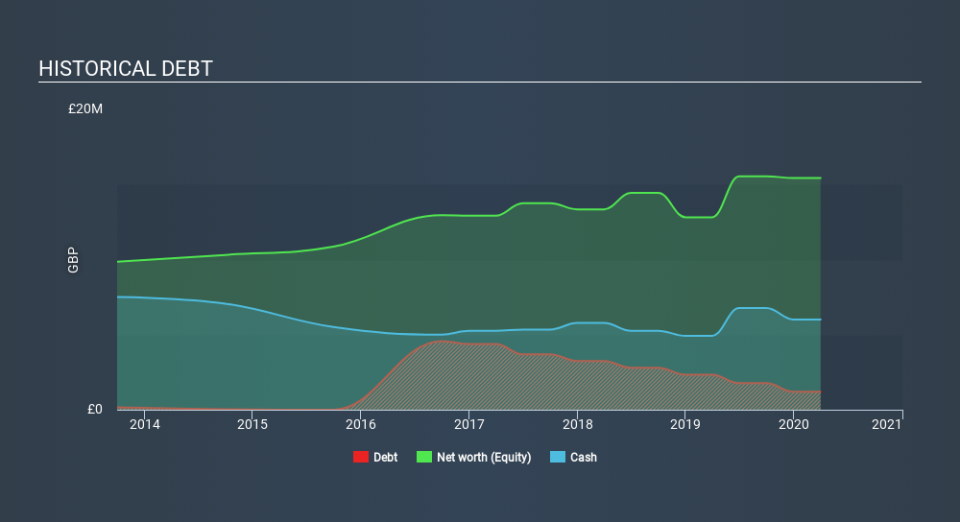We Think Cerillion (LON:CER) Can Manage Its Debt With Ease

David Iben put it well when he said, 'Volatility is not a risk we care about. What we care about is avoiding the permanent loss of capital. So it seems the smart money knows that debt - which is usually involved in bankruptcies - is a very important factor, when you assess how risky a company is. We can see that Cerillion PLC (LON:CER) does use debt in its business. But is this debt a concern to shareholders?
What Risk Does Debt Bring?
Debt assists a business until the business has trouble paying it off, either with new capital or with free cash flow. Ultimately, if the company can't fulfill its legal obligations to repay debt, shareholders could walk away with nothing. While that is not too common, we often do see indebted companies permanently diluting shareholders because lenders force them to raise capital at a distressed price. Of course, the upside of debt is that it often represents cheap capital, especially when it replaces dilution in a company with the ability to reinvest at high rates of return. The first step when considering a company's debt levels is to consider its cash and debt together.
View our latest analysis for Cerillion
What Is Cerillion's Net Debt?
You can click the graphic below for the historical numbers, but it shows that Cerillion had UK£1.20m of debt in March 2020, down from UK£2.34m, one year before. However, its balance sheet shows it holds UK£6.00m in cash, so it actually has UK£4.81m net cash.
How Strong Is Cerillion's Balance Sheet?
We can see from the most recent balance sheet that Cerillion had liabilities of UK£10.5m falling due within a year, and liabilities of UK£5.90m due beyond that. Offsetting this, it had UK£6.00m in cash and UK£11.1m in receivables that were due within 12 months. So it can boast UK£730.9k more liquid assets than total liabilities.
Having regard to Cerillion's size, it seems that its liquid assets are well balanced with its total liabilities. So while it's hard to imagine that the UK£90.3m company is struggling for cash, we still think it's worth monitoring its balance sheet. Succinctly put, Cerillion boasts net cash, so it's fair to say it does not have a heavy debt load!
Better yet, Cerillion grew its EBIT by 556% last year, which is an impressive improvement. That boost will make it even easier to pay down debt going forward. When analysing debt levels, the balance sheet is the obvious place to start. But it is future earnings, more than anything, that will determine Cerillion's ability to maintain a healthy balance sheet going forward. So if you want to see what the professionals think, you might find this free report on analyst profit forecasts to be interesting.
Finally, a company can only pay off debt with cold hard cash, not accounting profits. Cerillion may have net cash on the balance sheet, but it is still interesting to look at how well the business converts its earnings before interest and tax (EBIT) to free cash flow, because that will influence both its need for, and its capacity to manage debt. Over the last three years, Cerillion actually produced more free cash flow than EBIT. That sort of strong cash generation warms our hearts like a puppy in a bumblebee suit.
Summing up
While we empathize with investors who find debt concerning, you should keep in mind that Cerillion has net cash of UK£4.81m, as well as more liquid assets than liabilities. The cherry on top was that in converted 116% of that EBIT to free cash flow, bringing in UK£4.0m. So is Cerillion's debt a risk? It doesn't seem so to us. There's no doubt that we learn most about debt from the balance sheet. But ultimately, every company can contain risks that exist outside of the balance sheet. Consider for instance, the ever-present spectre of investment risk. We've identified 1 warning sign with Cerillion , and understanding them should be part of your investment process.
If you're interested in investing in businesses that can grow profits without the burden of debt, then check out this free list of growing businesses that have net cash on the balance sheet.
This article by Simply Wall St is general in nature. It does not constitute a recommendation to buy or sell any stock, and does not take account of your objectives, or your financial situation. We aim to bring you long-term focused analysis driven by fundamental data. Note that our analysis may not factor in the latest price-sensitive company announcements or qualitative material. Simply Wall St has no position in any stocks mentioned.
Have feedback on this article? Concerned about the content? Get in touch with us directly. Alternatively, email editorial-team@simplywallst.com.



